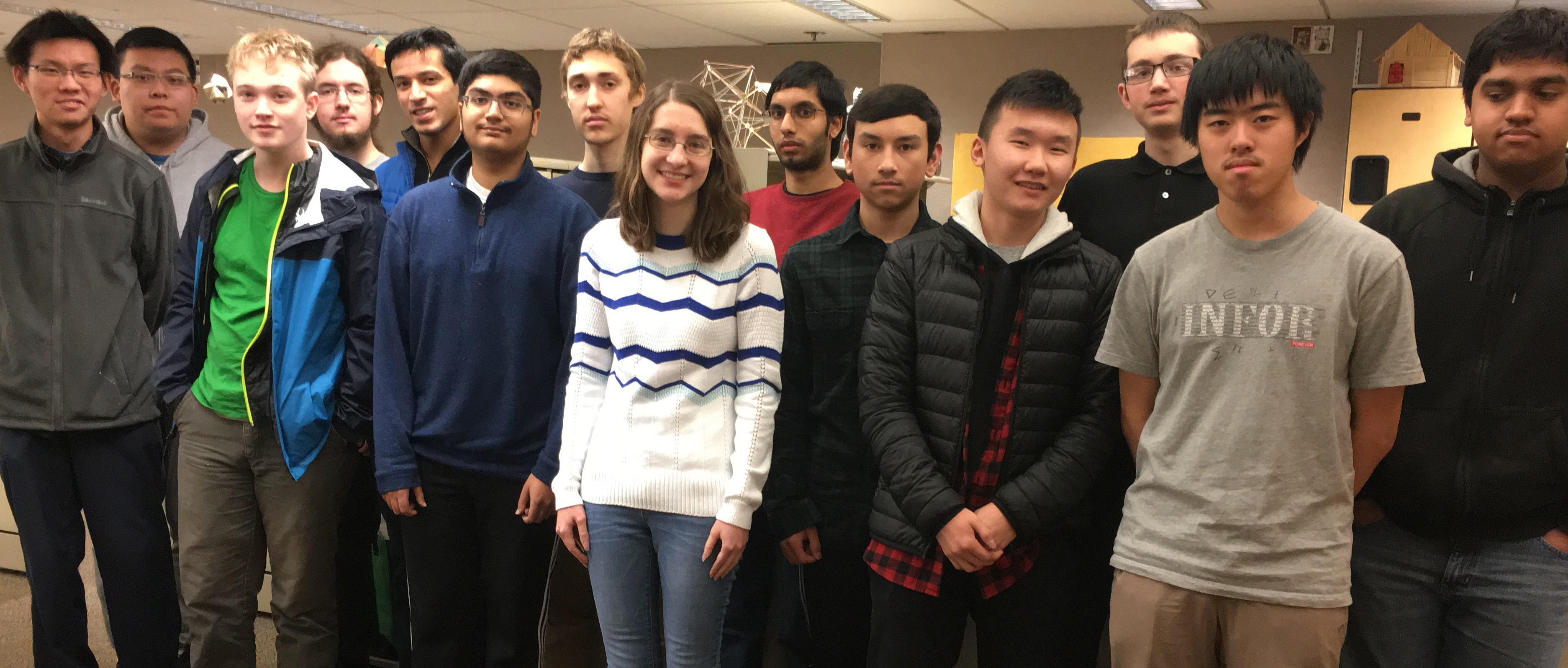Four years + six hours + one bout of flu. That was a winning equation for Will Dana when he competed in the prestigious William Lowell Putnam Mathematical Competition as a UW undergraduate.
In his fourth year taking the six-hour Putnam exam, flu-ridden Dana (BS, Mathematics, 2017) scored high enough to earn a coveted honorable mention in the competition. He also helped the UW team place in the top ten — the University of Washington’s highest ranking ever — alongside math powerhouses like MIT, Stanford, and Caltech.
Up to 5,000 undergraduates from U.S. and Canadian universities participate in the annual competition, which was introduced in 1938. The exam features twelve math problems so fiendishly difficult that it's rare for anyone to solve them all. In fact most students don’t solve any. “Putnam has only given out four perfect scores in its entire history,” says Dana. “Even if you just turn in a complete solution for one problem, you’re already doing decently.”

Ioana Dumitriu, UW professor of mathematics, did more than decently when she competed as an undergraduate. In 1996, Dumitriu was the first female Putnam Fellow — an honor bestowed on the top five in the competition — and from 1995 to 1997 she was the top female participant. At the UW, she helps students prepare for the competition, coaching them in weekly prep sessions offered by the Department of Mathematics. Dumitriu shares coaching duties with Julia Pevtsova, professor of mathematics, and Jonah Ostroff, lecturer in mathematics. This year, postdoctoral fellow Noah Forman coached as well.
“We get the brightest, the most enthusiastic, the most hard-working students,” says Pevtsova of the prep sessions. “Where else can one get such a concentration of brains and enthusiasm to learn? It is invigorating, and it is delightful to see them succeed.”
Where else can one get such a concentration of brains and enthusiasm to learn?
About two dozen undergraduates attend the weekly two-hour sessions, where they hone their mathematical problem-solving skills. The Department also offers an Art of Problem Solving course that covers similar topics. “The problems that come up in the Putnam Competition belong to a very wide class of problem types,” says Dumitriu. “For students to do well, they need to learn a range of problem-solving techniques.”
In addition to coaching students, Dumitriu has served as a grader for the Putnam exam several times. She has seen firsthand how a score can drop from a 10 — the highest for each problem — to a 2 because of a missing or confusing argument. “It’s very important to be able to communicate that you solved the problem,” says Dumitriu. “You have to be able to write solutions that are clear, concise, and thorough.” Because the Putnam’s grading system allows only scores between 0 to 2 and 8 to 10 — sort of a “go big or go home” philosophy — a minor omission can cause major damage. “The scoring is really brutal,” Dumitriu admits. “I don’t like it, but I understand the need for it. This way, you very clearly differentiate the people who know what they’re doing from those who are dabbling. Having been a grader, I can warn students about things I’ve seen that can really lower a score.”

But not this year. Dumitriu has had to recuse herself as a Putnam coach for the next three years while she serves on the committee that writes the exam. She says she’s honored to serve in this role, and challenged by the task. “The problems must be solvable in a limited amount of time, but also new to the students,” she says. “It’s hard.”
For students like Dana, tackling those problems is exciting. More than that, it’s fun. Pevtsova says that many math majors welcome the challenge, much like athletes thrive on the pressure of a big game. “Why do students play frisbee competitively, or soccer, or any other sport?” she says. “It excites them, they express themselves through it, and sometimes they also meet like-minded people at their practices. This is the same.” Adds Dana, “I always found the test super fun. If it were torture, I wouldn’t do it four years in a row. Nobody was forcing me to take the Putnam.”
Of course taking the exam with the flu is another story. In Dana’s senior year, he had been ill for several days before the test. “I woke up the morning of the test feeling bad enough that I seriously considered not showing up,” Dana recalls. But he’d been chosen as one of three UW students whose combined scores would comprise the UW team score, so he felt it was important to participate. “I decided to make an attempt, and that certainly turned out to be the right decision. In fact, as the day went on, I ended up feeling better, from which I can only conclude that math has miraculous restorative properties.”
The result was Dana’s best showing and the UW team’s highest placement, which reflected the combined scores of Dana and teammates Austin Stromme and Jasper Hugunin. (Hugunin, like Dana, earned an individual honorable mention.) Historically, the best individual performance by a Husky was in 2010, when William Johnson (BS, 2011) was named a Putnam Fellow.
Dana is now a graduate student at the University of Michigan, but undergrads who took the 2017 exam earlier this month — solving problems developed by Dumitriu — are more than ready to fill his Putnam shoes. They won’t learn their individual and team results until next April, but if one of them wins, earning Putnam Fellow status like Dumitriu and Johnson, the math world will take notice.
“People at top universities make a big deal of winning the Putnam,” says Dumitriu, who was courted by top graduate schools after becoming the first female winner. “It is definitely a badge of honor.”
More Stories

AI in the Classroom? For Faculty, It's Complicated
Three College of Arts & Sciences professors discuss the impact of AI on their teaching and on student learning. The consensus? It’s complicated.

What Students Really Think about AI
Arts & Sciences weigh in on their own use of AI and what they see as the benefits and drawbacks of AI use in undergraduate education more broadly.

Through Soil Science, an Adventure in Kyrgyzstan
Chemistry PhD alum Jonathan Cox spent most of 2025 in Kyrgyzstan, helping farmers improve their soil—and their crops—through soil testing.